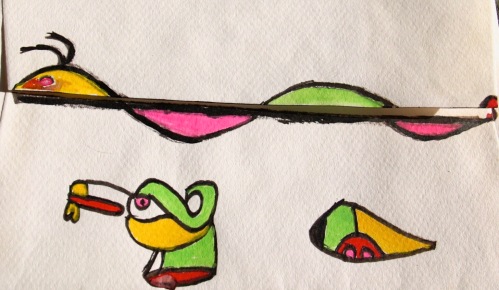
People of the Mist
Oaxaca, Mexico
Prologue
I saw my father this evening. I walked through the zócalo, opened the main cathedral doors, looked up, and there he stood, motionless. The lights shone on the engraved glass panels and illuminated him, as if he were some long passed saint come back to visit me. We stared at each other, but I couldn’t open my mouth to speak. The hairs on my neck stood on end and my hands shook. When I forced my mouth open, words stuck in my throat. He wore his best grey suit over a light blue shirt and a dark blue, hand woven tie. This was the outfit in which I had buried him.
Three old women, dressed in black, broke the spell. One stood in front of me and wouldn’t let me approach my father. She held a large bag of knitting in her hands and the wool spilled everywhere as she pushed me away. The second threatened me with a pair of scissors that she held in her left hand. The third shook a tailor’s measuring rod in my father’s face. He nodded, smiled sadly, and they all turned their backs on me and hurried away out of the cathedral and into the square.
I stood there in silence. Then, as the door snapped shut, I pulled it open and ran after them. The setting sun filled the square with shadows that whispered and moved this way and that, as if a whole village had come down from the hills to walk beneath the trees and dance in the rays of the dying sun. I stood on the cathedral steps and called out my father’s name, but I could see no sign of him among the cut and thrust of the shadowy crowd.
I ran out into that crowd and pushed at insubstantial people who stood firm one moment and then melted away the next like clouds or thick mist. I came to a side street and saw real people, flesh and blood beings, a group of villagers grouped behind their band. I stopped as the village elder put a live match to the taper of the rocket he clutched between his thumb and forefinger. The taper caught on fire and as the rocket roared upwards the village band started to play a military march. Thus encouraged, the rocket clawed its way into the sky to explode with a loud knock on the door of the gods.
Tired of grasping at shadows and afraid of this living phalanx of men marching towards me I went back to the cathedral and knelt at the altar of La Virgen de la Soledad, the patron saint of Oaxaca. Real wax candles stood before her altar, not tiny electric bulbs, as there are in some of the smaller churches. I put five pesos in the slot and lit a fresh candle from an ageing one that had started to sputter. For the first time in years I said a prayer, first for the soul I had saved from extinction by lighting my candle from his flame, then for my mother, then for the real father whom I had never known, and finally for the man I had just seen.
Tim closed his journal, screwed the top back on his Mont Blanc pen, laid it on the table, put his head in his hands and sat there, thinking. Then he got up, went to the kitchen, opened his last bottle of Sol de Oaxaca, poured the quarter litre that remained of the mescal into a glass. Six wrinkled worms floated down through the yellow liquid wriggling as if they were live. He pulled them out with a spoon, popped them one by one into his mouth and swallowed them whole. They tasted of smoke and garlic but he knew they would bring him visions and dreams. Then he wrinkled his nose and swallowed the mescal in three fierce, burning gulps.
He coughed, blinked the tears from his eyes and went into the bedroom where he undressed and climbed into bed. The ceiling fan droned on and on like a large propeller on a long-distance flight. Sleep did not come easily, nor did dreams, in spite of the mescal. When the dreams did come, they built like thunder clouds and he entered them with fear and a strange kind of joyous expectancy.
Comment:
This is the prologue from my first novel, People of the Mist. Following in the footsteps of my two blogger role models, Meg Sorick and Mr. Cake, I will publish People of the Mist, chapter by chapter, on this blog, as I revise it. I am a poet, rather than a novelist, as you will see. Your comments will be welcome as I start this venture in the old year (2016) and plan to continue through the new (2017).










